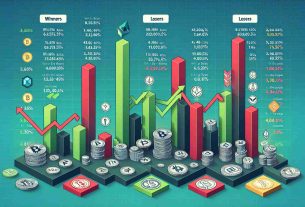XRP and Cardano are facing an uphill battle when it comes to being considered for their own exchange-traded funds (ETFs). A comprehensive study by GSR has revealed that both cryptocurrencies have significant shortcomings in critical areas needed for ETF viability. According to the analysis, which took decentralization and market demand into consideration, the potential for XRP and Cardano ETFs to receive the green light seems unlikely in the near future.
Restrictions on ETF approval have been brought into focus as GSR published scores emphasizing the difficulties for XRP and Cardano in the crypto market. These scores were derived under strict assessment criteria, including the level of decentralization and the current market demand for these digital assets.
Decentralization woes plague both currencies, with XRP scoring -0.9 and Cardano -0.1, positioning them unfavorably in comparison to their competition. This indicates weaknesses in their structures, such as limited permissionless participation and token distribution, which can affect their eligibility for ETFs.
Market demand deficit is also a point of concern, with XRP and Cardano recording scores of -0.2 and -0.5 respectively. These results suggest that they do not possess a strong enough presence or appeal in the market to back the establishment of a dedicated ETF currently.
The pathway to improving XRP and Cardano’s fortunes involves bolstering decentralization through increases in permissionless activities and equitable distribution of tokens. Growth in market capitalization, uplift in trade volumes, and proactive community engagement can also elevate their demand scores.
Despite their current positions, improvement is possible. Strategic technological upgrades, alliances, and wider usage of their platforms can stimulate demand. More importantly, demonstrating practical applications and engaging communities are crucial steps in paving the way for potential ETF consideration in the future.
Important Questions and Answers:
1. Why is decentralization important in the context of ETFs for cryptocurrencies like XRP and Cardao?
Decentralization is a fundamental principle of blockchain technology, reflecting a system where control and decision-making are distributed across a wide network rather than concentrated in a single entity. ETFs, being investment vehicles that must comply with regulatory standards, often require underlying assets to be decentralized to ensure fairness, mitigate risks of manipulation, and adhere to the principles of an open and competitive market. Cryptocurrencies with a higher degree of decentralization are more likely to be seen as suitable underlying assets for ETFs.
2. What does market demand mean in relation to potential cryptocurrency ETFs?
Market demand refers to the interest and eagerness of investors to buy into the cryptocurrency market. For ETFs, there must be substantial investor appetite to justify the creation of an investment product. High demand implies a likelihood of sufficient trading volume and liquidity, which are critical for the healthy operation of an ETF.
3. Can XRP and Cardano address the concerns mentioned?
Improvement for XPR and Cardano is possible. For instance, increasing the number of validators or the decentralization of the decision-making process could help improve their decentralization scores. Additionally, by highlighting unique technological advancements, forging strategic partnerships, and increasing practical use cases, they can potentially boost market demand for their cryptocurrencies.
Key Challenges and Controversies:
A key challenge for both XRP and Cardano is navigating the high regulatory compliance standards required for ETF approval. For XRP, this is exacerbated by ongoing legal challenges, like the lawsuit with the US Securities and Exchange Commission (SEC), which questions whether XRP should be classified as a security. Such legal uncertainties cast doubt on its eligibility for ETFs. Cardano has also faced scrutiny over its slow development process and delays in delivering promised features, which could affect investor confidence and market demand.
Advantages and Disadvantages:
The creation of an ETF for a cryptocurrency like XRP or Cardano could provide several advantages, such as:
– Increased Accessibility: ETFs make it easier for traditional investors to gain exposure to cryptocurrencies without the complexities of handling and securing digital assets.
– Diversification: Investors can diversify their portfolios without directly purchasing cryptocurrencies, potentially mitigating risks.
– Regulatory Oversight: ETFs are regulated financial products, potentially offering a safer investment vehicle compared to unregulated crypto exchanges.
However, there are downsides to consider as well:
– Centralization Risks: If the underlying cryptocurrency is not sufficiently decentralized, it may be more vulnerable to manipulation and control, which doesn’t align with the ethos of blockchain technologies.
– Regulatory Scrutiny: Cryptocurrency ETFs could face challenges from regulators that may delay or prevent their approval.
– Market Volatility: Cryptocurrency values can be highly volatile, and an ETF tied to them may inherit that volatility.
If you wish to explore further, here are some related links:
– U.S. Securities and Exchange Commission
– GSR
Improvements in technology, wider adoption, increased demand, regulatory clarity, and addressing centralization can pave the way for potential ETF consideration for XRP and Cardano in the future. However, the timeline for such improvements remains uncertain, and significant efforts would be required from the respective organizations behind these cryptocurrencies to address the concerns raised by entities like GSR.



